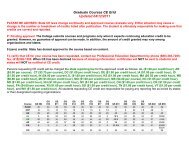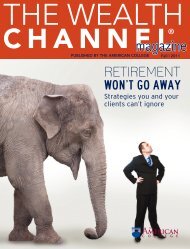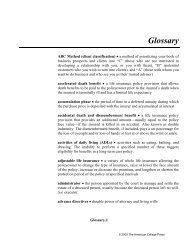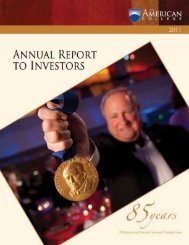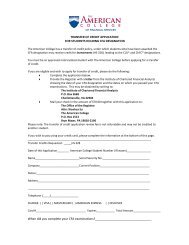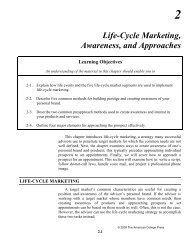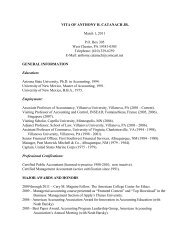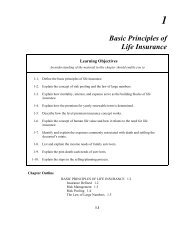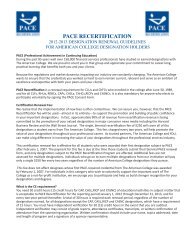section 1 - The American College Online Learning Center
section 1 - The American College Online Learning Center
section 1 - The American College Online Learning Center
Create successful ePaper yourself
Turn your PDF publications into a flip-book with our unique Google optimized e-Paper software.
(2) Some funds that are promoted as actively managed funds even though arereally “closeted index funds.” In other words, they have almost the sameinvestment mix as the indexed fund.(3) Planning Point: If the client chooses an actively managed fund, make surethat the fund manager is exerting effort by looking at the active share dataavailable through some data bases and acting accordingly.(4) If the actively managed fund is performing like the index, it is likely that theportfolio manager has created a “closeted index fund.”(5) Closeted index funds may be more prevalent in Europe.c. Planning Point: Invest in newly launched funds.(1) Karoui and Meier (2009) 7 find that newly launched mutual funds outperformmore established funds. Such funds also have more concentratedportfolios and invest in less liquid stocks, which suggests that theiroutperformance stems from greater autonomy in portfolio choice they areafforded by having a small base of investor capital.(a) More concentration means they hold fewer stocks. This means themanager is investing more heavily in their best ideas.(b) Newly launched funds invest more in less liquid stocks. Recentresearch has shown that these stocks receive a higher rate ofreturn. In other words, there is compensation for the illiquidity.d. Planning Point: Invest in funds with managers and directors who have “skin inthe game.”(1) Khorana, Servaes, and Wedge (2007) 8 examine the relationship betweena portfolio manager’s investment in their mutual funds and the futureperformance of those funds. <strong>The</strong> authors find that per every basis pointincrease in the proportion of a fund that is owned by a portfolio manager,risk-adjusted performance increases by 2.4 to 5.0 basis points per year,depending on model specification.(2) <strong>The</strong> authors conclude that portfolio manager ownership is indicative offuture performance and espouse two possible explanations for this.(a) First, fund managers with high ownership have superior informationabout the future performance of their fund(b) Second, such managers have a stronger incentive to exert effort.(<strong>The</strong>y try harder!)(3) Similarly, Cremers, Driessen, Maenhout, and Weinbaum (2009) 9 findthat funds with low ownership by members of their board of directorsunderperform by at least 2% a year on average.(4) <strong>The</strong> “skin-in-the-game” data can be hard to come by. Morningstar Directand SEC filings are ways in which it may be found.e. Planning Point: Invest in institutional class shares, if you qualify7. Meier, I., & Karoui, A. (2009). Mutual fund tournaments. Working paper.8. Khorana, A., Servaes, H., & Wedge, L. (2006). Portfolio manager ownership and fund performance. Working paper.9. Cremers, M., Driessen, J., Maenhout, P., & Weinbaum, D. (2009). Does skin in the game matter? director incentives andgovernance in the mutual fund industry. Journal of Financial and Quantitative Analysis, 44(6), 1345-1373.3.29





